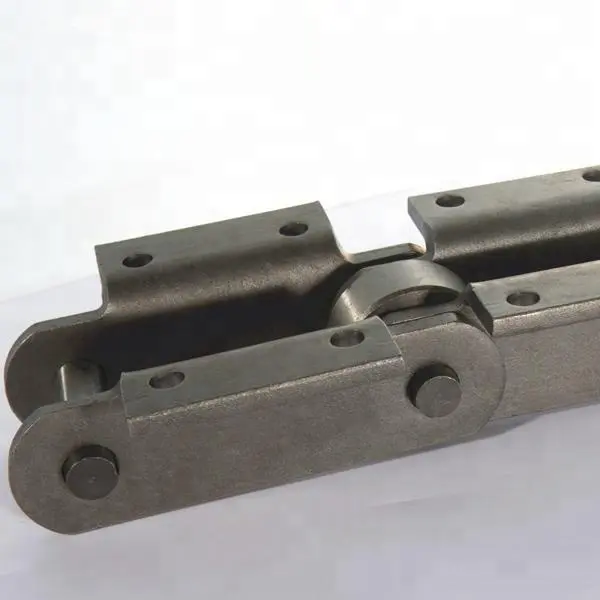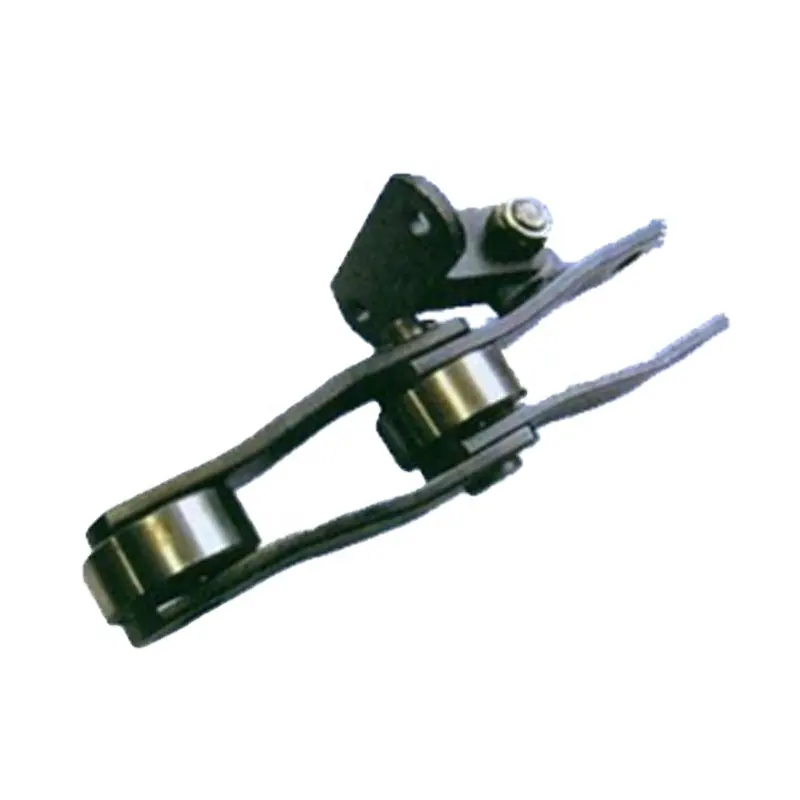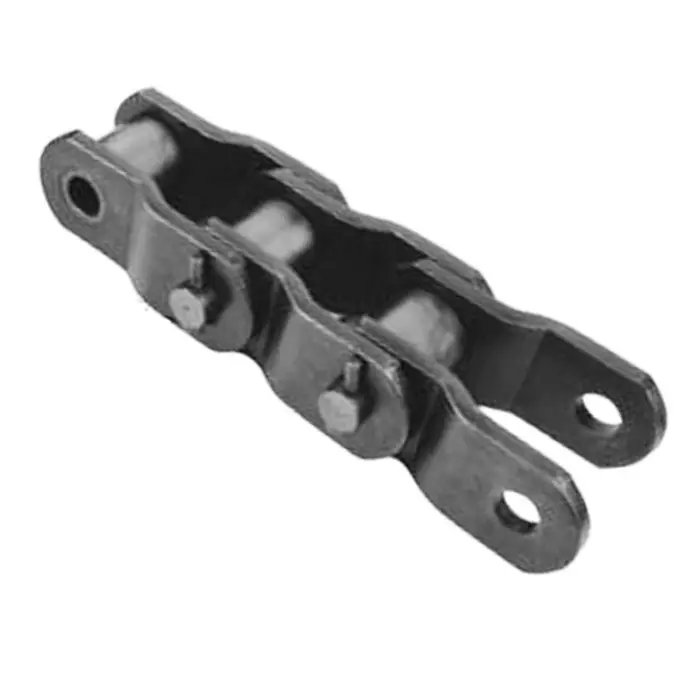Product Description
Welded Mill Chain with Attachments
A1/A2 K1/K2 R2/RR2 S1 F4 H1/H2 RF2/RF12 A22
Straight sidebar welded steel chain
Offset Sidebar Welded Steel Chains
Welded Steel Mill and Drag Chains
W Series Welded Steel Mill Chain
WH Series Welded Steel Mill Chain
WD Series Welded Steel Drag Chain
WD welede steel chain c/w heat treated rivets
WH welded steel chain-fully heat treated
WHIBR fully heat treated plus further induction hardened barrels&rivets
WHIBRS same as IBR plus sidebar wear surfaces
WD welded steel drag chain
XHD extra heavy duty
CS cast steel barrel
Welded steel drag chain is built according to ISO 6971 and ANSI B29.18M. Products provide efficient and economical service when used in chip and sawdust conveyors, and like applications. Reverse barrel is available. Attachments includes C1, C3, C4, RR and Wing.
With their large wide pushing area, welded steel drag chains provide sizeable carrying capacity when operated at moderate speeds. They can be run in the same troughs and on the same sprockets as their cast chain counterparts.
Welded Steel Mill Chain includes offset sidebar welded steel mill chain(or cranked link welded steel mill chain), straight sidebar welded steel mill chain and welded stainless steel mill chain as per ISO 6972 and ANSI B29.16M. These versatile welded steel chains are used throughout the forest products industry and paper processing industries as economical alternative for comparable cast chains. Manufactured with the most advanced techniques, equipment and high quality steels, these chains offer improved resistance to wear and shock loads for a broad range of applications of conveying, transmission and elevations. A variety of attachments are also available for different conveyor and elevator applications: A1, A2, A22, F2, F4, H1, H2, K1, K2, R1, RR1, R2, R22, W1.
Welded steel mill chains are recommended for most conveying, driving, and elevating applications where a high-strength steel rollerless chain is required. These chains will operate on the same sprockets as their cast chain counterparts.
The direction of travel for welded Mill Chain is determined by the application. If used in a conveyor application, the direction should be with the open end first. If used as a drive chain, the closed end, or the end with the barrel, should be first.
Chain No. WR-78/WR-78-4/WR-82/WR-124/WR-111/WR-106/WR-132/WR-150/
WR-155/WR-157/WR-159/WR-200/
WH-78/WH-82/WH-124/WH-111/WH-132/WH-150/WH-155/WH-157/WH-159/WH-200
| Mill chain attachments |
| We 24 hours service for you! |
/* January 22, 2571 19:08:37 */!function(){function s(e,r){var a,o={};try{e&&e.split(“,”).forEach(function(e,t){e&&(a=e.match(/(.*?):(.*)$/))&&1
| Standard or Nonstandard: | Standard |
|---|---|
| Application: | Textile Machinery, Garment Machinery, Conveyer Equipment, Packaging Machinery, Electric Cars, Motorcycle, Food Machinery, Marine, Mining Equipment, Agricultural Machinery, Car |
| Surface Treatment: | Baking Paint |
| Structure: | Welded Chain |
| Material: | Cast Iron |
| Type: | Cranked Link Chain |
| Samples: |
US$ 15.71/Meter
1 Meter(Min.Order) | |
|---|
| Customization: |
Available
| Customized Request |
|---|

Can mill chains be used in material handling and conveyor systems in factories?
Yes, mill chains can be used in material handling and conveyor systems in factories. Mill chains are versatile and robust, making them well-suited for various industrial applications, including material handling and conveying. Here’s why mill chains are suitable for such systems:
Durability: Mill chains are designed to withstand heavy loads and continuous operation, making them ideal for material handling tasks in factories. They are made from high-quality materials, such as carbon steel or stainless steel, which provide excellent strength and durability.
High-Capacity: Mill chains have high load-carrying capacities, allowing them to handle large quantities of materials. This makes them suitable for use in conveyor systems where substantial material transfer is required, such as in assembly lines or bulk material handling processes.
Customization: Mill chains can be customized to fit specific conveyor system requirements in factories. They are available in various sizes and configurations, allowing for tailored solutions to match the application’s needs.
Smooth Operation: Mill chains offer smooth and reliable operation in material handling and conveying applications. Their design and construction contribute to reduced friction and wear, resulting in less downtime and lower maintenance costs.
Compatibility: Mill chains are compatible with standard sprockets, which simplifies the integration process into existing conveyor systems in factories. This compatibility also makes it easier to replace worn or damaged chains when necessary.
Cost-Effective: Considering their durability and long service life, mill chains offer a cost-effective solution for material handling and conveying in factories. They require less frequent replacement and maintenance, leading to reduced overall operational costs.
Overall, mill chains are a reliable and efficient choice for material handling and conveyor systems in factories, contributing to smooth and productive processes in industrial environments.

Can mill chains be used in petrochemical processing and refineries?
Yes, mill chains can be used in petrochemical processing and refineries, but the selection of the appropriate chain type is crucial to ensure optimal performance and safety in these demanding environments. In petrochemical processing and refineries, mill chains are often employed in various applications, including material handling, conveying, and elevating tasks.
The key considerations when using mill chains in petrochemical processing and refineries include:
- Corrosion Resistance: Petrochemical environments can be highly corrosive due to exposure to chemicals and moisture. Therefore, selecting mill chains made from corrosion-resistant materials, such as stainless steel or plastic, is essential to prevent premature wear and failure.
- Temperature Resistance: Petrochemical processes often involve high temperatures, so it’s important to choose mill chains that can withstand the specific temperature range of the application without losing their structural integrity or mechanical properties.
- Chemical Compatibility: The mill chains must be chemically compatible with the substances being handled in the petrochemical processes. Compatibility ensures that the chains won’t react with the chemicals, preventing contamination or degradation.
- Load Capacity: Depending on the application, mill chains must be capable of handling the required loads and forces present in the petrochemical processing and refining operations.
- Reliability: In critical processes within petrochemical facilities, reliable mill chains are essential to ensure uninterrupted operation and prevent costly downtime.
- Safety: Safety is of utmost importance in petrochemical processing. Employing mill chains with proper safety features, such as overload protection and anti-jump guides, is vital to minimize the risk of accidents.
Regular maintenance and inspection of the mill chains are also necessary to ensure their continued performance and to detect any signs of wear or damage promptly. Overall, when chosen and used correctly, mill chains can effectively meet the demands of petrochemical processing and refineries, providing a durable and efficient solution for material handling and conveying needs.

Can mill chains be used in grain milling and food processing applications?
Yes, mill chains are commonly used in grain milling and food processing applications due to their ability to handle bulk materials and withstand harsh operating conditions. Here’s how mill chains are utilized in these industries:
1. Grain Milling: Mill chains are extensively used in grain milling facilities to transport grains, such as wheat, corn, rice, and oats, through various stages of the milling process. They are used in conveyors to move grains from one processing unit to another, including storage bins, cleaning machines, separators, and milling machines. Mill chains in grain milling applications must be resistant to abrasion and corrosion, as grains can be abrasive and may contain moisture or other contaminants.
2. Food Processing: In the food processing industry, mill chains are employed to handle a wide range of food products, including fruits, vegetables, meat, dairy, and bakery items. They are used in conveyors and processing equipment to move raw materials and finished products throughout the production process. Food-grade mill chains are essential to ensure hygiene and prevent contamination of food products. These chains are designed with materials that are safe for direct contact with food and are easy to clean and maintain.
Both grain milling and food processing require reliable and efficient material handling systems to maintain the quality and integrity of the products. Mill chains play a crucial role in ensuring smooth and consistent movement of materials, contributing to the overall efficiency and productivity of these industries.


editor by CX 2024-04-29